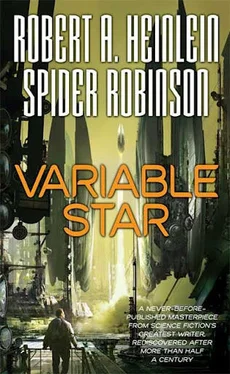I used the pause to get hold of myself, control my breath, and figure out what to say to cure his misconceptions. I even had a second or two to appreciate the surreality of having a phone conversation on a public slidewalk with one of the wealthiest living humans. Then I waited to seize control of the conversation the moment his eyes returned to mine.
Waste of time; once again he simply ignored the fact that I was speaking. “If you do measure up, you will become a Conrad, with all that implies. If you don’t—well, you and your children will be Johnstons, but considerably better off than you would otherwise be. One of the pleasant things about this dynasty is that we can be liberal in pensioning off those who don’t quite make it.” I’d have tried to interrupt if there’d been any point. “If you turned out to have no real head for business but were tops in research, say, you might end up as Dr. Johnston, Chief of Kindelberger Research Laboratories. Or you might choose to simply lie in the sun in Cairns, and that can be arranged, too—we can afford to be generous. One moment.”
Once again he spoke briefly and inaudibly with someone else, this time in his lower right-hand corner. This time when his gaze returned to me I was ready with a very loud, “Mr. Conrad, sir!”
I think he literally didn’t know how to process insolence. Insufficient experience. It shut him up long enough for me to wedge four more words in edgewise. It took a surprising amount of courage to say them.
“The answer is no.”
He tried to frown and raise his eyebrows in surprise at the same time. Even Conrad of Conrad must have heard those words before—or he’d own everything , instead of only about a quarter of it. But he clearly hadn’t expected to hear them now, from me. “You mean you don’t want to marry my granddaughter?”
Surprising him cheered me up. I reminded myself that I had once bitten this man. Hard, as I recalled. “Don’t misunderstand me. If Jinny wants to get married right away, we’ll get married. I’ll swing it somehow. But I do not intend to let someone else lay out my life according to some kind of time table and tell me when to wipe my nose—no matter how well the job pays. It’s not a question of measuring up. I’ll do my own measuring. And I’ll pay my own way. Thanks anyway, I appreciate it, I do appreciate it—but keep your free lunch, it’s not for me.”
He glanced up and to the right, and this time forgot to mute his audio. “Tell the Secretary of State I will be a few minutes late.” I think he really did forget, because when he said those words his voice was flat and cold, and when he turned back to me it had become warm and fatherly. “I admire spirit in a young man, I really do. We can’t hold this thing together with yes-men and flunkies at the top. Your answer convinces me more than anything else that little Jinnia Anne has made a wise choice. Nevertheless, I must convince you that we need you—and that you need training. We’ve got to crowd thirty years of training into the next ten—it’s been proved over and over again that, despite the wonders of modern geriatrics, young men must be allowed to make top decisions before age, experience, and caution grow on them like rust or mold. We must strive for a young man’s drive and an old man’s knowledge. Not easy.” He sighed. “And the young have all the time in the world. I wish I did. You want to sleep on it, I can see that. Looks like you could use the sleep, too.” Without taking his eyes from mine, he told someone, “Joel will call me at this code tomorrow at 0900 PST.”
I started to ask him what code to use to reach Jinny—but he had already broken the connection.
I tried Redialing the number—and was told it was a null. I could guess it would remain one, at least for me, until tomorrow morning at nine.
I went to Jinny’s apartment that night. She had moved out. No forwarding address. I caught one of her neighbors looking at me with pity. I agreed with her.
I did not call Conrad at 0900 the next morning. For the next half hour, I was braced for him to call me, or have some flunky summon me, but he did not. For the rest of the morning, I was halfway prepared for two large men to bust in my door and drag me out to a black limo, but nothing of the sort occurred.
A little after noon, there was incoming mail, a text-only message. It was a letter from Stony Brook, informing me without even a polite pretense of regret that my scholarship had been turned down. It didn’t say why, but it didn’t need to.
Every single plan I had made for my life lay in ruins. No degree, no career, no future, no Jinny, no family—unless I consented to serve at stud while training to run a multiplanet dynasty. My only two lifestyle choices were to be a dole bludger, or one of the wealthiest gigolos alive.
I wanted, very badly, to get so wasted that my previous bender would seem a mere preamble.
Instead, I did not so much as drink a beer or take an acetaminophen. I spent the day taking care of a number of tedious details and formalities. I ate a healthy dinner, retired early, got a good night’s sleep. In the morning, I filled a backpack with the belongings and food I hadn’t disposed of the day before, locked the apartment behind me for the last time, and headed for a crosstown slidewalk.
A little over seventeen hours later I persuaded Dr. Rivera (whose breath smelled like strawberries that day) that I was sober enough to apply for a slot on the waiting list for a berth on the RSS Sheffield . The expedition’s backers had no connection whatsoever with the Conrad dynasty; my application was accepted. That very afternoon, one of the colonists who’d already been accepted managed to kill himself on one last rock-climbing trip. The next day I was informed that I had been chosen to replace him.
I was on my way to Immega 714, aka Peekaboo. Where I would live out my life on the planet called Brasil Novo.
There is no wealth but life.
—John Ruskin
There were other candidates, of course, some of whom had been waiting years longer than I had, and a great many of them had more impressive skill sets or resources than I did, as well. But such decisions are rarely made fairly. What got me the berth—late starter, dead broke, and all—was a combination of three specific unfair advantages I had over my competitors.
First, of course, was what would have been a disadvantage in just about any other enterprise, with the possible exception of prostitution: my extreme youth. I had only just become a legal adult. You want young people on a voyage expected to last nearly twenty years, ship time, and over ninety years Earth time—but not a lot of them volunteer for such a trip. If they do, and are turned down, they tend to go away and make another plan. It’s not really the sort of trip young people sit around and pine for, at least not now that the first waves have gone. Not happy healthy ones, anyway.
The next important factor was sheer coincidence: the Sheffield ’s boost rate. She would blast at a constant acceleration of exactly one-third gee—and I was from Ganymede. I’d be one of the few around who felt normal, for a change. For once, I’d be markedly better adapted, more effective, than those I was with. Even fewer Ganymedeans or Marsmen tended to sign up for star travel than did teenagers; they were just too busy.
But what cinched the deal was, I was from Ganymede. That is, I was one of no more than a handful of star colonists who had any practical, hands-on experience whatsoever with… pause for ironic drumroll… dirt farming!
You can’t blame Earthlings for not knowing much about that: despite what they named their planet, really good dirt is getting hard to come by, there. (God knows the Prophet wasted enough of it for them, may his concept of Hell actually appear, for just long enough to accept him.) But most Terrans haven’t even done any hydroponic farming, and the few who have are generally too rich to make good candidates for interstellar refugees. There is something to be said for scarcity. The total food-growing experience of most Sheffield passengers was almost indistinguishable from zero.
Читать дальше










